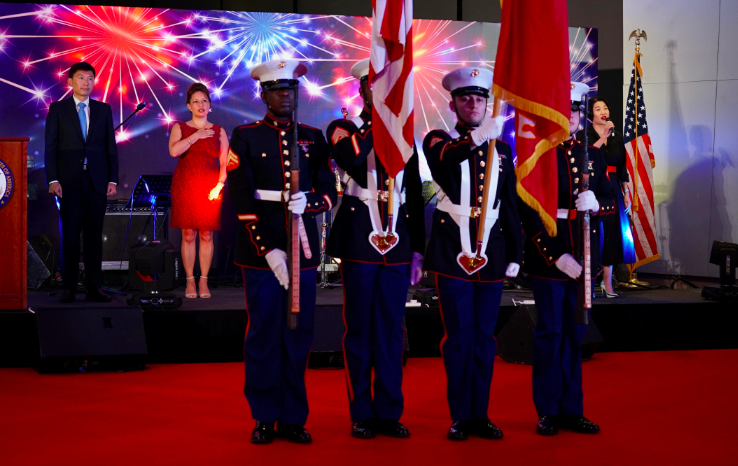Singapore—As the United States celebrated Independence Day on July 4, Thursday, Stephanie Syptak-Ramnath, charge d’affaires of the US Embassy in Singapore, wrote a letter to The Straits Times (ST) to thank Singaporeans for their warm wishes, referring specifically to Mr Tommy Koh, who had written “A birthday letter to America” earlier this week, also in the ST.
Ms. Syptak-Ramnath, who will be leaving her post at the end of the month, wrote about how she has “witnessed” the US and Singapore’s “relationship grow from strength to strength over the past three years,” citing military, economic and security cooperation, as when Singapore hosted the historic Trump-Kim summit in 2018.
She also mentioned that “bilateral trade in goods and services rose by 20 percent last year, making us Singapore’s largest trade partner in services by more than double any other country.”
Additionally, the US charge d’affaires mentions Singapore’s support for the presence of US military forces in this part of the world, and also that there are “1,000 Singapore Armed Forces personnel training in the US, more than any other foreign military.”
She wrote, “When it comes to keeping our countries and the region safe, we are confident in our continued success because we have trained side by side for decades, view each other as an equal partner and friend, and remain united in purpose and ideals.”
The question is if Singapore and the United States have such a strong relationship, why hasn’t there been a US ambassador in the country for more than two and a half years?
An empty ambassadorship
When Donald Trump was inaugurated in January 2017, former Ambassador Kirk Wagar resigned his post, as is customary.
A close ally of Mr Trump, K T McFarland, had been nominated to the ambassadorship of Singapore in May 2017. She was a former Deputy US National Security Adviser who had worked under Michael Flynn, a key figure in the Russia investigation.
In July of that year, Ms McFarland testified in a Senate hearing that she had not been “not aware of any of the issues or events” concerning Mr Flynn’s communication with the Russian Ambassador, a fact disputed by emails that the New York Times obtained showing that she had, indeed, known that Mr Flynn and former Russian Ambassador to Washington Sergey Kislyak had exchanged emails.
Appointees need to be confirmed by the Senate, but Senators Cory Booker and Ben Cardin has said that Ms McFarland “may have provided information to the Senate Foreign Relations Committee that conflicts with recent media reports regarding her knowledge and involvement in matters pertaining to contacts during the Trump Presidential Transition,” and thus, her appointment went unconfirmed.
She was renominated for the position when the US Congress re-convened, but Ms McFarland asked the President to withdraw her nomination by February 2018.
She wrote to Mr Trump, saying, “I am asking that you withdraw my nomination to be the U.S. Ambassador to Singapore.
I have come to this decision reluctantly because I believe in your mission.”
In response, the President said in a statement, “K.T. served my administration with distinction. Unfortunately, some Democrats chose to play politics rather than move forward with a qualified nominee for a critically important post.”
Since then, the duties of the US Ambassador to Singapore have been performed by Ms Syptak-Ramnath. It is unknown who her replacement will be.
Two years ago, former Barack Obama foreign policy adviser Matthew Goodman told the South China Morning Post (SCMP), “Against the background of doubts about US strategy in the Asia Pacific – in particular the lack of a credible economic strategy – I do think it’s important for the Trump administration to get ambassadors out to key posts like Singapore as soon as possible.”
Not having a permanent ambassador raises the question of the US’ commitment to issues in the region, said Hugo Brennan, a Singapore-based political risk analyst with Verisk Maplecroft. “The Trump administration’s failure to fill the post will fuel a narrative of wavering US commitment to the region, particularly since Singapore holds the ASEAN chair in 2018.”
Since 2017, the US has not had an ambassador to the ASEAN either, when Nina Hachigian, an appointee of former President Barack Obama, stepped down./ TISG
Read also:China says US tariffs must be lifted for a trade deal

